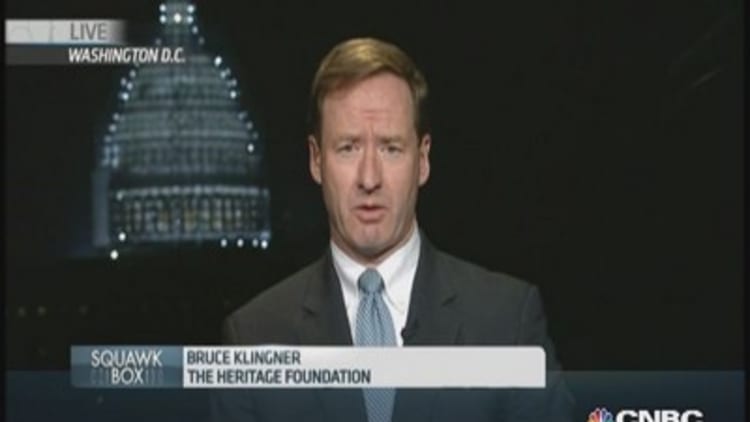Economists are now divided over whether South Korea's central bank will move to ease monetary policy this week after President Park Geun-hye on Monday surprised markets during her annual address to the nation by hinting of further rate cuts.
During the televised speech, Park pledged to "ensure that macroeconomic policy organizations collaborate to come up with timely responses," including interest rate cuts.
The comments sent South Korean bonds rallying on Monday, with the 1-year Treasury bond yield hitting a record closing low of 1.981 percent, as the consensus going into this week was for no change in monetary policy.
Read MoreKeep faith in SouthKorean shares? Maybe not, say experts
Officials later clarified that Park wasn't necessarily alluding to another rate cut, which would be the third since August of last year, but market watchers says her comments would inevitably put pressure on the Bank of Korea (BOK) to ease.
"President Park devoted much of her speech to reviving the economy through the three-year economic innovation plan announced last February... however, the obvious inference was that she was pressuring the Monetary Policy Committee (MPC) to increase accommodation at Thursday's meeting," said Tim Condon, head of research, Asia, at ING, in a note on Tuesday.
"The unusual remark leads us to think the odds of the cut occurring at the January 15 Monetary Policy Committee meeting have increased," Condon added. ING is forecasting a 25 basis-point rate cut to 1.75 percent during the meeting on Thursday, from 2 percent currently.
While the BOK acts as an independent entity, it is widely believed the government influences its decisions. Many analysts have attributed the 25-basis-point rate cuts in August and then in October to pressure from Finance Minister and Deputy Prime Minister Choi Kyung-hwan.

Weak growth environment
Political pressure aside, recent economic data do bolster the case for looser monetary conditions in Asia's fourth-largest economy, according to a report from Australia New Zealand Banking (ANZ) this week.
December headline inflation sank to its lowest levels since 1999 and deflationary risks are high with inflation expectations among consumers over the next year at a record low, official data showed last month.
Read MoreIs South Koreaheaded for Japan-style deflation?
"It seems that the BOK is in the process of deciding on its inflation outlook. While we continue to express our policy call for an imminent interest rate cut to arrest deflationary risk, it seems to us that the BOK is formulating a justification for the cut," said Raymond Yeung, economist at ANZ. "The risk of our call is that the central bank may delay the action this week."
Concerns over the outlook of the economy also prompted the government to revise down 2014 growth estimates to 3.4 percent from 3.7 percent, and some analysts are expecting the BOK to do to same.
HSBC economist Ronald Man expects the MPC will slash 2015 growth to to 3.1 percent from 3.9 percent currently.
Rates to go lower, sooner or later
Even if the BOK stands pat on Thursday, many expect another rate cut down the line.
HSBC is penciling in a lower policy rate for February or March. "A lower growth and inflation outlook typically justifies a lower policy rate. But recent rhetoric from officials in Korea suggests that there is no sense of urgency for monetary easing this month," Man said.
Wai Ho Leung, senior economist at Barclays, is forecasting a rate hike in the third quarter on expectations that lower oil prices will boost economic growth in the April-May period.
Westpac expects no change, but adds that "the central bank is sounding more neutral of late, but the case is made if they wish to surprise."
The BOK has a history of going against market consensus in terms of rate decisions, making surprise moves in 2011, 2012 and 2013.

